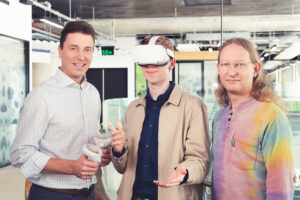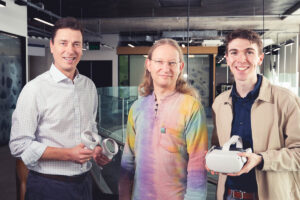Researchers from Flinders University’s Medical Device Research Institute (MDRI) and UniSA are set to develop a new rehabilitation technique for stroke survivors using state-of-the-art Virtual Reality (VR) technology.
MDRI member, Dr David Hobbs has been awarded a Flinders Foundation Health Seed Grant to design and test a unique virtual environment – explored through an immersive VR headset – to help increase chronic stroke survivors’ interest and engagement in upper limb rehabilitation exercises as they work to regain function.
“The system will be based on physiotherapy and occupational therapy principles, focusing specifically o n mirror therapy, with a musical twist,” says PhD candidate, Thomas Beltrame, who is collaborating with Dr Hobbs on the project.
n mirror therapy, with a musical twist,” says PhD candidate, Thomas Beltrame, who is collaborating with Dr Hobbs on the project.
“Music has been shown to produce physical, psychological, and cognitive benefits, however, musical instruments can be very challenging to play while recovering from an upper limb impairment, particularly when hand function is limited.
“Therefore, we are creating abstract musical instruments in VR that don’t exist in the real world, where the method of play will be directly linked to physical movements known to promote motor recovery.”
Designed for stroke survivors to undertake some of their rehab at home, the system will also assist in reducing some of the travel required to attend sessions in a clinic or hospital.
“When someone has a stroke, the aftereffects can be debilitating and lasting, and these effects can range from partial paralysis to impairment of speech, un derstanding, and memory,” Dr Hobbs explains.
derstanding, and memory,” Dr Hobbs explains.
“Our research will hopefully benefit all post-stroke survivors, but it is specifically targeted towards those who are usually referred to as “chronic” patients, who have had their stroke more than six months ago.
“If successful, the functional improvements for the patient will hopefully translate to an improved quality of life for both them and their primary carer as well.”
Once designed and tested, the system will be trialled with 30 stroke survivors asked to use the system at home for eight weeks.
Dr Hobbs’ project is one of 31 health and medical research projects to share in $750,000 funding, to support exciting research projects across a variety of illnesses, diseases, and social issues, as part of Flinders Foundation’s Health Seed Grant Round in partnership with Flinders University.
The project is being undertaken by technical and clinical researchers, with expertise in engineering, physiotherapy, and neuroscience, including Dr David Hobbs, Mr Thomas Beltrame, Associate Professor Kenneth Pope, Professor Susan Hillier, and Associate Professor Belinda Lange.
(Photos provided by Flinders Foundation)

